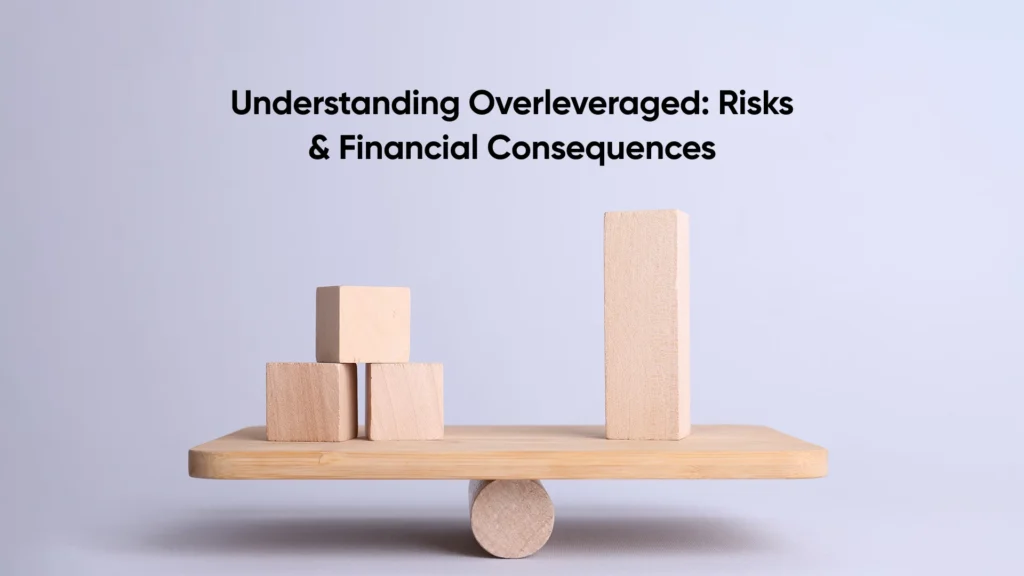Understanding Overleveraged: Risks & Financial Consequences

Taking on debt can be a smart way to reach your personal or business goals, but too much of it can create serious problems. This is known as being overleveraged. Whether you’re having trouble keeping up with loan payments or finding it harder to save for the future, the risks of carrying excessive debt are real. For businesses, it can mean trouble paying bills, losing investor confidence, or even facing bankruptcy.
This guide will help you understand what overleveraging means, the risks involved, and how to avoid falling into a financial trap.
Table of Contents
ToggleWhat Does Overleveraged Mean?
Overleveraged means an individual or a business has borrowed more money than their ability to repay it. Being overleveraged may lead to a financial downfall and lead to more borrowing. It may lead to growth constraints, loss of assets, limitations on further borrowing, and the inability to attract new investors (for businesses).
Causes of Overleveraging
It is imperative to understand the causes of overleveraging to learn how to manage it. Here are a few reasons of overleveraging:
For Individuals
Excessive Borrowing: When an individual borrows beyond their repayment capacity by taking multiple loans, credit cards, car loans etc.
Over-Reliance on Future Income: One may take on a higher loan amount assuming future income may increase.
Lifestyle: One may spend beyond their means to maintain a certain lifestyle like hiring a driver or buying an expensive phone.
Poor Budgeting: If you don’t allocate proper funds to each category of expense, it may lead to poor management of your finances.
Emergency Expenses: One may face a sudden unexpected expense like a medical emergency, job loss, travel expense or home repair.
For Businesses
Aggressive Expansion: A business might borrow heavily to grow quickly, which can be smart. However, it’s crucial to plan for potential losses and ensure the expansion is manageable enough to recover if things don’t go as planned.
Economic Downturn: During economic downturns, businesses often face reduced cash flows, making it harder to pay off debts. This can lead to overleveraging, especially for companies that depend heavily on borrowed money.
Also Read: Consolidate your Debt with Personal Loan
Risks Associated with Being Overleveraged
Overleveraging leads to many financial challenges, whether it is for a business or an individual. These are some key risks one may face when they are overleveraged:
For an Individual
Impacts Debt Repayment: As the debt becomes more, one faces difficulties making monthly repayments. This may lead to late penalties, and missed payments due to the rise in debt.
Drop in Credit Score: Overleveraging negatively impacts credit score due to an increase in missed payments, high credit utilization ratios, or defaults. Low credit score makes it much more difficult to get credit in the future.
Financial Stress: Managing excessive debt impacts leads to mental strain. This affects one’s overall well-being and strains relationships with family and friends.
Limited Financial Freedom: A large portion of one’s income goes toward debt payments. This limits the ability to save, invest, or respond to emergencies.
Asset Seizure or Foreclosure: Failure to make repayments on secured loans can lead to losing one’s assets like property, FD.
Risk of Bankruptcy: In extreme cases, individuals may need to file for bankruptcy, hurting their finances and reputation for years.
For a Business
Cash Flow Constraints: Excessive debt can lead to high-interest obligations, reducing available cash for operations, growth, and reinvestment.
Difficulty Getting New Investors: Investors may view an overleveraged business as high-risk. Moreover, if they do agree, they may ask for high stakes in the company to provide liquidity for the business.
Limitations on Future Borrowing: Banks and lenders check credit carefully, so an overleveraged business may struggle to get approved for new loans or funding.
Financial Consequences of Overleveraging
Here are a few financial consequences of overleveraging:
- Your credit score gets negatively impacted due to missed payments, increasing your debt.
- It limits your future loan opportunities, as lenders may see you as high-risk individual.
- If you do get a personal loan, it may be at a higher interest rate.
- Financial stress due to overleveraging impacts other areas of your life and may strain relationships with loved ones.
How to Identify If You Are Overleveraged
Want to check if you are overleveraged? Check these factors to assess if you are overleveraged:
For Individuals
High Debt-to-Income Ratio (DTI): If a large portion of your monthly income is going toward debt payments (e.g., over 40%), it is a cause of concern.
Struggling with Minimum Payments: If you find it difficult to pay even the minimum amount on credit cards indicates financial strain.
Maxed-Out Credit Lines: If you have exceeded in utilizing credit limits signals overleveraging.
Living Paycheck to Paycheck: If most of your income goes toward debt, leaving little for savings or emergencies, you may be overleveraged.
Relying on Debt for Essentials: If you have to get a loan or rely on a credit card to cover your basic expenses it is a warning sign.
Declined Credit Applications: Being denied new credit or offered high interest rates suggests lenders see you as high-risk.
For Businesses
High Debt-to-Equity Ratio (D/E): A D/E ratio above industry norms indicates the business is carrying too much debt compared to its equity.
Struggling to Meet Debt Obligations: Difficulty making loan repayments, especially interest, shows overleveraging.
Declining Creditworthiness: Poor credit ratings or higher interest rates from lenders indicate financial instability.
Reliance on Debt for Operations: Heavily relying on loans for daily operations, payroll, or inventory signals financial imbalance.
Limited Access to New Capital: Being unable to secure new loans or investments is a sign of too much-existing debt.
Vulnerability to Economic Changes: If small changes in revenue (e.g., during a downturn) put the business at risk of default, it may be overleveraged.
Strategies to Manage and Reduce Overleveraging
Prioritize essential expenses: Focus on spending only on essential expenses like housing, utilities, and food. Set a budget for each category to manage them effectively.
Cut down on non-essentials: Until you achieve some financial stability, cut down on expenses like dining, shopping or take-out. Reduce spending on other such areas, to reduce your financial burden.
Build an Emergency Fund: Save a set amount per month that goes towards building an emergency fund for unexpected expenses like medical or home repairs.
Pay off High-Interest Debt: To manage overleveraging, pay off high-interest debt, to reduce debt.
Negotiate with lenders: Request your lender to lower the interest rate or offer a repayment structure that is manageable for you based on your current financial situation.
Seek Expert Help: If you find it difficult to reduce overleveraging, consider seeking a professional who can offer you a more tailored plan.
Also Read: 8 Effective Strategies for Paying Off Your Debts
Conclusion
Being overleveraged can put both individuals and businesses in a vulnerable financial state. Understanding the risks is the first step toward managing debt wisely. Keep track of your expenses, live within your means, and make informed borrowing decisions to avoid accumulating excessive debt. It may seem challenging initially, but there are actionable steps you can take to regain control of your finances. Take measures to build an emergency fund, cut unnecessary expenses, or seek professional guidance to get yourself out of being overleveraged.
Frequently Asked Questions
What Is The Definition Of Overleveraging?
Overleveraging occurs when a business borrows more money than it can handle, making it unable to cover its operating costs or repay the debt.
How Can Overleveraging Impact My Financial Health?
Overleveraging can severely impact your financial health by increasing debt beyond your ability to repay. This can lead to cash flow problems, missed payments, higher interest costs, and potentially even bankruptcy.
What Are Common Signs That Indicate I Might Be Overleveraged?
Common signs of overleveraging include consistently struggling to make debt payments, relying on new loans to pay off old debt, and having a high debt-to-income ratio. If you find yourself borrowing more than you can afford to repay, it could be a sign that you’re overleveraged.
How Does Consolidating Debt Affect My Credit Score?
Overleveraging typically results in higher credit utilization and missed payments, both of which are key factors that can negatively impact credit scores.
Are There Tools To Help Assess My Leverage Ratio?
You can utilize several tools to assess your leverage ratio like Debt-to-Income (DTI) Ratio Calculators, Credit Score Tools or Debt Management Apps.
What Are The Long-Term Consequences Of Remaining Overleveraged?
Remaining overleveraged can damage your credit score, loss of assets, create a debt cycle, and increase financial stress, ultimately risking bankruptcy and limiting future growth opportunities.
How Does Overleveraging Differ Between Individuals And Corporations?
With overleveraging, the key difference lies in the scale and complexity of debt management, where corporations typically have more intricate financial structures, making their overleveraging potentially more impactful on the market compared to an individual’s situation.
What Role Does Financial Planning Play In Preventing Overleveraging?
Financial planning plays a key role in preventing overleveraging, be it an individual or a business. It is important to borrow responsibly and effectively manage finances to prevent overleveraging.
YOU MAY ALSO LIKE

Search by posts
Recent post
-
 समान मासिक किस्त: आपकी वित्तीय खर्चों को आसान बनाने वाला तरीका
समान मासिक किस्त: आपकी वित्तीय खर्चों को आसान बनाने वाला तरीका
-
 Apply for 50000 Rupees Loan Urgently: Get Disbursed in Few Minutes
Apply for 50000 Rupees Loan Urgently: Get Disbursed in Few Minutes
-
 How to get Instant Loan on Aadhaar Card without Salary Slip
How to get Instant Loan on Aadhaar Card without Salary Slip
-
 How to Apply for a Rs. 25,000 Loan on an Aadhaar Card?
How to Apply for a Rs. 25,000 Loan on an Aadhaar Card?
-
 How to Get ₹30,000 loan without income proof: Quick Ways
How to Get ₹30,000 loan without income proof: Quick Ways
Categories
- Blog (6)
- Credit History (36)
- Credit Line (7)
- Festive (4)
- Finance (15)
- Mutual Fund (19)
- Personal Loan (275)
- Tax (8)
- Zype (4)













